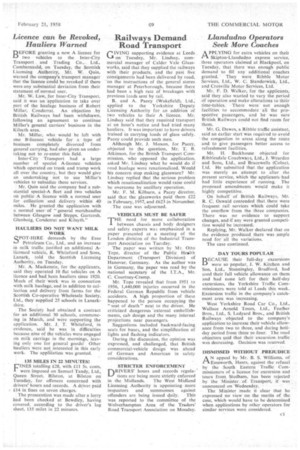Railways Demand Road Transport
Page 39

If you've noticed an error in this article please click here to report it so we can fix it.
GIVING supporting evidence at Leeds on Tuesday, Mr. Lindsay, commercial manager of Calder Vale Glassworks, said that they supplied the railways with their products, and the past five. consignments had been delivered by road, on the instructions of the general stores manager at Peterborough, because there had been a high rate of breakages with previous loads sent by rail.
B. and A. Pacey (Wakefield), Ltd.; applied to the Yorkshire Deputy Licensing Authority for an addition of two vehicles to their A .licence. Mr. Lindsay said that they required transport at an hour's notice and had tried many hauliers. It was important to have drivers trained in carrying loads of glass safely. Pacey could provide such men.
Although Mr. J. Moxon, for Pacey, objected to the question, Mr. T. B. Atkinson, for the British Transport .COmmission, who opposed the application, asked Mr. Lindsay what he would do if road haulage were renationalized. Would his concern stop making glassware? Mr. Lindsay replied that the serious problem which renationalization would raise could be overcome by ancillary operation.
Mr. F. M. Kilburn, a Pacey director, said that the glassworks paid them £22 in February, 1957, and £623 in November.
The case was adjourned.
VEHICLES MUST BE SAFER THE need for more collaboration between chassis and body designers and safety experts was emphasized in a paper presented at a meeting of the London division of the Industrial Transport Association on Tuesday.
The paper was written by Mr. Otto Tope, director of the Public Health Department (Transport Division) of Hanover, Germany. As the author was in Germany, the paper was read by the national secretary of the I.T.A., Mr. C. Courtney-Cramp.
Mr. Tope revealed that from 1951 to 1956, 1,440,000 injuries occurred in the Federal German Republic from vehicle accidents. A high proportion of these happened to the person occupying the " seat of death" next to the driver. He criticized dangerous external embellish'ments, cab design and the many internal projections near passengers.
Suggestions included backward-facing seats for buses, and the simplification of lights and flashing indicators.
During the discussion, the opinion was expressed, and challenged, that British commercial-vehicle design was ahead of German and American in safety considerations.
STRICTER ENFORCEMENT ThRIVERS' hours and records regula-• tions are being more strictly enforced
in the Midlands. The West Midland Licensing Authority is appointing more inspectors and summonses against offenders are being issued daily. -This was reported to the committee of the Wolverhampton Area of the Traders' Road Transport Association on Monday.












































































































